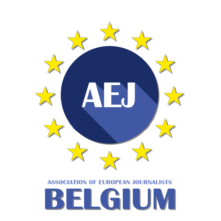By David Poelemans

Virtually within eyeshot of ‘Mannekenpis,’ behind an unassuming door and down an old courtyard, an organization recently made its home. Rémy Bonny is the 28-year-old Executive Director of ‘Forbidden Colours,’ an organization advocating for the rights of the LGBTQ+ community. The Association of European Journalists was invited to talk with Bonny about the group and his own experiences.
The road that eventually led him to Forbidden Colours was filled with experiences that continue to impact his work today as the Executive Director. After completing his studies, Bonny traveled across Eastern and Central Europe, where he encountered prejudices firsthand.
“It is my job to ensure that the entire plus community can enjoy the full gamut of human rights and democracy,” said Bonny. The emergence of anti-LGBTQ+ groups across Europe has increased pressure on LGBTQ+ communities.
Throughout his years in the field, Bonny came to recognize the significant role Russia plays in fomenting strife between LGBTQ+ communities and conservative actors. Bonny says that he has witnessed the long hand of the Russian propaganda machine manifest itself through local anti-LGBTQ+ movements in Eastern and Central Europe.
“Recently, we started working with the Strategic Communications Unit at the European External Action Service,” the LGBTQ+ expert noted. “They actively fight the spread of Russian disinformation. Something our organization also views as a significant threat.”
Forbidden Colours seeks to push back against groups who put pressure on the LGBTQ+ community. One such group is the ‘World Congress of Families,’ an American coalition known for its hostile stance on abortion and same-sex marriages. In 2019, Bonny infiltrated a meeting of theirs in Verona.
“For my research in Verona, I infiltrated their annual meeting. However, my presence did not go unnoticed, and they ejected me out of the conference rather unceremoniously,” he recalled.
The organization is heavily subsidized by Russian oligarchs. As reported by the non-profit research group ‘Political Research Associates’, “Russian conservatives were vital in the creation of the coalition, often inviting like-minded Russian activists to speak at their annual global conference.”
As Bonny put it, “Part of their strategy is to spread disinformation online and sow discord.” The encroachment of Russian conservative thought upon the European community in matters such as the rights of the LGBTQ+ community is rooted in the Russkiy Mir ideology. A concept Bonny puts into context.
“Many ‘intellectual conservatives’ espouse the ideology of the Russkiy Mir, Russian for a ‘Russian world,’ an ideology that seeks to impose the cultural hegemony of traditional Russian values,” he said.
Similarly, in 2016, the ‘German Council of Foreign Relations’ noted that this ideology blurs the lines between countries to justify protecting Russian interests elsewhere.“For as long as there are regimes in Europe who seek to scapegoat communities to bring about anti-democratic objectives, it will remain difficult for us to fight for the rights of the LGBTQ+ communities all over Europe, Bonny added.
One of the major achievements of the group was a recent lawsuit filed against Viktor Orban’s government. In 2021, a bill was introduced in the Hungarian parliament that prohibits the promoting or campaigning for pro-LGBTQ+ rights. The EU Commission views the law as a violation of human dignity and EU Single Market laws as well as an infringement upon one’s freedom of expression and right to non-discrimination. The lawsuit has been backed by 15 EU member states.
“In spite of some initial reservations by the EU Commission, considering the political sensitivities that come with such a move, it received the go-ahead, and the lawsuit was filed,” the Forbidden Colours executive director noted.
Lamenting the EU Commission’s prior lack of concern about Russia’s meddling in the affairs of European LGBTQ+ rights, Bonny noted that, as a result of his work, some commissioners are now significantly more receptive to the idea of getting tough on Russian meddling, especially in the wake of the war in Ukraine.
“I approached EU functionaries five years ago on the same topic, but they would usually say that while true, there were more pressing matters that needed addressing,” Bonny lamented.
Forging alliances
By forging new alliances with like-minded parties and individuals, Forbidden Colours aims to curtail Russia’s malevolent influence upon EU member states. His organization will consult with other NGOs and charities in order to better adapt its activities to other countries.
Whilst modest in size, Forbidden Colours does not remain idle in its efforts to shed light on the issues plaguing the rights of the LGBTQ+ community. Notably, it hosts The ‘United 4 Diversity Kick-off Days’ conference, an event financed by the Belgian Ministry of Foreign Affairs. “We even have the Minister of Foreign Affairs, Hadja Lahbib, as a guest speaker,” he glowed.
While much of Bonny’s work revolves around preventing anti-LGBTQ+ actors from eating away at the rights of LGBTQ+ individuals, he points to some encouraging trends. A poll conducted by Forbidden Colours and local partners in Hungary indicated that a majority of Hungarians were now in favor of same-sex marriage, and an even more significant number viewed legal gender changes favorably. With these kinds of polls, the other side of the coin comes into clearer view.
In spite of the considerable opposition Forbidden Colours faces as a prominent proponent of more inclusive human rights, Bonny remains optimistic.
“In recent years, we can see a significant rise in acceptance rates of LGBTQ rights. If you look at the results of our poll in Hungary, it would be difficult to claim that Hungarian society is either homophobic or transphobic,” he concluded.
